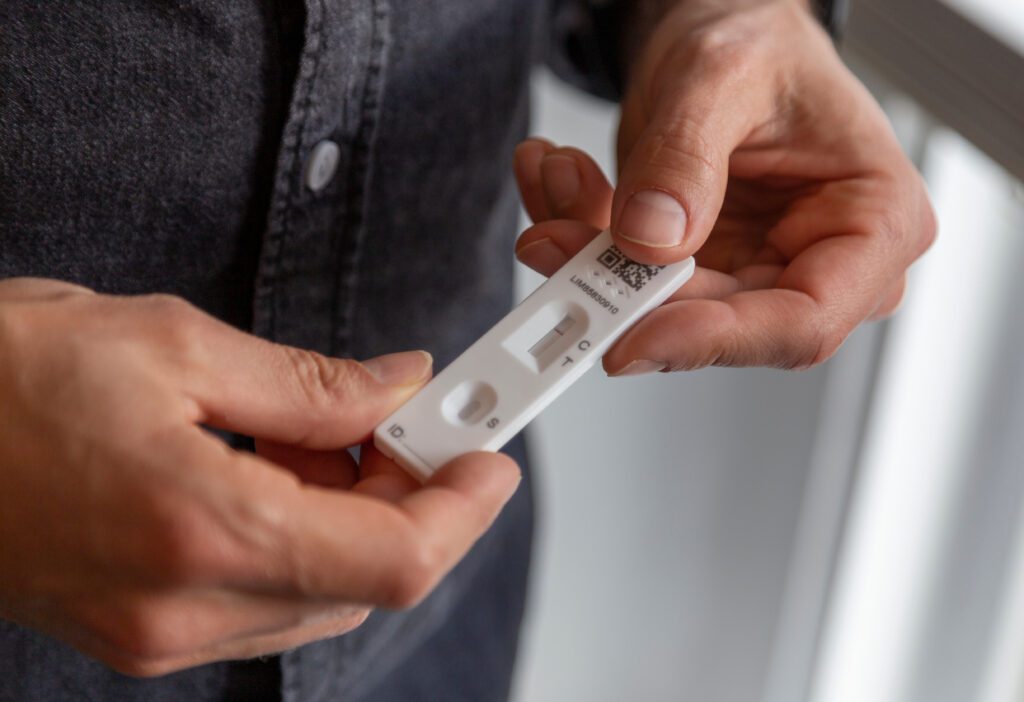
The huge increase in COVID-19 cases across the country in recent weeks has shown that the pandemic is not over and highlighted that we must keep working together to slow the spread of the virus, protect others and reduce pressure on the NHS.
Regular testing, and self-isolating when needed, is essential to reduce COVID-19 transmission and keep you and the people around you safe.
As the pandemic progresses, it’s important that we keep reviewing all available data and evidence and make policy changes at the right time.
With infections at the highest level they have been since the start of the pandemic and demand for tests very high, we must use LFD and PCR tests where they have the most impact; reducing the spread of COVID-19 and protecting the most vulnerable.
From 11 January, we’ve made an important temporary change to COVID-19 testing; If you receive a positive rapid lateral flow test result, you now do not need to take a PCR test to confirm your positive result.
1.The timing is right to implement a temporary change to testing
Rapid lateral flow tests are an important way of allowing people who don’t have COVID-19 symptoms to find out if they are infected.
Prior to 11 January people who tested positive using a lateral flow test were asked to take a PCR test to confirm the result, but we now have a clear reason to temporarily suspend the need for this follow up PCR.
Suspending follow up PCRs is a tried and tested measure. We successfully suspended them last January (2021) and reintroduced them in March when case numbers dropped again.
Lateral flow tests have an estimated specificity of at least 99.97%, which means that fewer than 3 in every 10,000 tests will result in a false positive.
Rates of COVID-19 are currently very high and with this high prevalence it is very likely that a positive rapid lateral flow test means you do have COVID-19.
Please remember that if you test positive using a rapid lateral flow test you should self-isolate immediately, and report your test results, whether they are positive or negative.
Reporting your test results is a quick and easy process and enables us to understand the number of cases of COVID-19 in the country and ensures people who test positive are given the appropriate health advice.
2.PCR tests are still essential for people with symptoms
We are not discouraging people who need them to get a PCR test. If you develop any of the main symptoms of COVID-19 (a high temperature, a new, continuous cough or you’ve lost your sense of smell or taste or they’ve changed) you should still get a PCR test immediately, rather than a rapid lateral flow test.
If you have received a positive lateral flow test result but have no symptoms, then develop symptoms while you are isolating, it is not necessary to confirm your positive result with a follow up PCR. Your positive lateral flow test result means it is very likely you have the virus.
But if your symptoms are getting worse and you are concerned you should seek medical attention.
3.There are some situations where a follow up PCR test is still required
People who have a positive rapid lateral flow test result should only have a follow-up PCR test if:
- they wish to claim the Test and Trace Support Payment
- they have a health condition that means they may be suitable for new coronavirus (COVID-19) treatments. They will have received a letter from the NHS informing them of this and will be given PCR kits to use whenever they have symptoms
- they are taking LFD tests as part of research or surveillance programmes, and the programme asks them to do so
- they have a positive day 2 LFD test after arriving in England
4.With COVID-19 at record levels, boosting testing capacity and using different types of test wisely is crucial
We continue to expand our testing capacity and urge anyone who needs to access either rapid lateral flow tests, or a PCR test, to keep checking GOV.UK regularly.
The UK’s testing programme is the biggest in Europe with over 1.7bn LFD’s distributed since the start of the pandemic and delivery capacity increased to 7m LFDs per day.
100,000 more PCR booking slots have been made available per day since mid-December and capacity continues to be expanded.
But we must continue to use LFD and PCR tests where they have the most impact in reducing the spread of COVID-19 and protecting the most vulnerable.
5.Testing and self-isolation are vital, but there are other important ways to slow the spread of the virus too
Don’t forget that there are a number of measures that will protect you and others around you from COVID-19:
- make sure you’ve received your first and second dose of the COVID-19 vaccine and book your booster when you are eligible
- wear a well-fitting face covering where you are required to by law and in crowded or enclosed places
- if you socialise indoors, let fresh air in as much as possible. Meeting outdoors is safer
- wash your hands regularly
